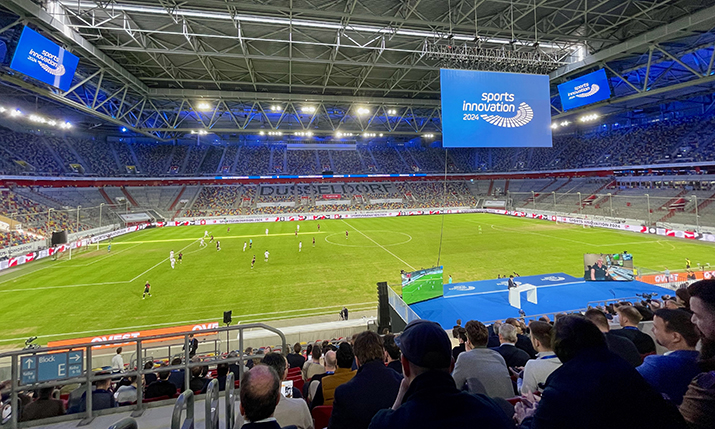Sports Innovation 2024: Wonderment and warnings in equal measure as AI dominates Düsseldorf event

Artificial Intelligence (AI) and in particular Generative AI (GenAI) was a key talking point at Sports Innovation 2024 in Düsseldorf this week (20-21 March 2024) with interesting broadcast-related innovations countered by warnings about the challenges AI might pose.
The Deutsche Fußball Liga (DFL) hosted event at the Merkur Spiel-Arena adjacent to the Rhine in the North of the city welcomed visitors from across Europe who came to hear about innovations not just in broadcasting but also fan experience, stadium technology and performance analysis.
Those with a TV or media sensibility would have taken note of the cameras and camera systems, graphics applications, viewer experiences, and more, but at the heart of many on-stage presentations, and the conversations in the networking area and on the booths (regardless of the technology on show) was AI.
On stage, the DFL, for one, announced that it has extended its partnership with Amazon Web Services (AWS), a move that will see GenAI used to create multiple real-time personalised text versions of match commentary during Bundesliga and Bundesliga 2 matches.
But, in his opening comments, DFL CEO Steffen Merkel argued that the sports world has a responsibility when it comes to GenAI, citing the problems that Deep Fakes might cause ahead of the US Election.
“GenAI is a skills amplifier, not a skills democratiser. If you suck at your job, you are still going to suck!”
Viewers are looking for emotions, he said, and the next media rights packages being tendered for the Bundesliga will be different, with different offerings for all generations. But at no point will there be any doubt as to what is real and what is not.
“We welcome progress,” he said. “We will use AI where it helps us create media. But we will always make clear what is genuine and what is not. It is our duty to be a role model.”
He added that the DFL is developing guidelines on the use of AI and GenAI.
During Navigate the AI Revolution: Strategies for Leadership and Innovation, Shelly Palmer from The Palmer Group provided some historical background on AI, before declaring about GenAI: “The only way to get anything out of those tools is through subject matter expertise. Anyone can prompt craft and prompt engineer. But if you are great at your job, this toolset will make you three to five times more productive. It is a skills amplifier, not a skills democratiser. If you suck at your job, you are still going to suck!”
To succeed, you have to innovate workflow and process innovation in parallel to GenAI, he added.
Away from AI, DFL-subsidiary Sportcast, the host broadcaster of the Bundesliga, showcased the Top Match concept for its biggest matches.
With academy players from Bundesliga teams playing a training game on the stadium pitch, Tim Achberger, head of innovation & technology management at Sportcast, talked the delegates through the 52-camera set-up covering the game, highlighting specialist cameras in particular.
A motorised dolly (or buggy cam) was first up. For Bundesliga games, this can be located on the touchline from 60 yards along up to near the corner flag, following a fixed line. It can also be used to add movement on the pitch before or after the game, and as a ‘corner cam’ during the game, capturing close-ups of the kicker.
“Being close to the game and the players is important for us,” he said. “Cinema cameras are something we see more and more. It is interesting because you see closeness and sharpness.
“We added remote cameras to offer a reverse view of the [subs bench] too. It just focuses on the players and coaches and we can provide a split screen too. We think this can add value to our Top Match Concept.”
“Cinema cameras are something we see more and more. It is interesting because you see closeness and sharpness.”
On a similar theme, Achberger also covered Body cams, with two players wearing vests with cameras that provide a footballer’s point of view of the action.
This innovation has already been used in the German Super Cup during the warm-ups. In Dusseldorf, delegates were shown a live shot from the chest of the players during the game. Usage of this kind of technology will only be possible with authorisation from the sport’s governing and regulatory bodies, of course.
A high-speed drone, a Ref cam and a Game Mode Camera giving a video game-like experience (much like the one trialled at Arsenal’s Emirates Stadium for Premier League games) were also shown.
The latter camera was smaller than the one used in England. “We want to see when is the right point to integrate it for our core production,” said Achberger.
Remote production on Bundesliga 2 was also discussed, with plans to go remote from the next rights cycle.
A demo showed a seven-camera setup with electric cars powering an on-site tech hub. Signals were sent via a 5Gb line using JPEG XS compression back to Cologne where they were switched and graphics added before being outputted. Everything in the Production Operation Centre was software and IP-based.
Achberger and his colleague in Cologne agreed: “For the crew, it feels like they are in the OB van and they can control the set up as usual. The hardware we need is quite small. It fits in one server rack.”
11 partners were involved in this set-up: EVS, Grass Valley, Hyundai, RTL, Riedel, Lawo, TV Skyline, TVN and VIDI
“We are looking for the right set-up to understand how we will produce from 2025,” concluded Achberger.
Sport Innovation 2024 took place in Dusseldorf 20-21 March.


